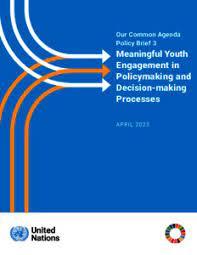
https://www.un.org/sites/un2.un.org/files/our-common-agenda-policy-brief...
The world today has the knowledge and resources required to deliver on the promise of the 2030 Agenda for Sustainable Development. But transformative changes will simply not be possible at the scale required without the buy-in and contributions of a wide range of actors.
This is especially true of the 1.2 billion young people alive today. Youth are key to identifying new solutions that will secure the breakthroughs that our world urgently needs.
As future custodians of the planet, they also stand to lose the most if societies become more insecure and unequal and if the triple planetary crisis continues unabated. In recent years, young people have become a driving force for societal change through social mobilization – pushing for climate action, seeking racial justice, promoting gender equality and demanding dignity for all. There have also been countless examples of young people driving innovative change in a host of arenas, such as in business, technology and science.
When it comes to participation in public policymaking and decision-making, however, youth remain almost invisible. This is evident at the national level, where mechanisms such as youth parliaments or youth councils struggle to make an impact on decisions being taken at the cabinet table, votes on domestic budgets, compromises in a peace process or agreements on a just transition. The same is true in the multilateral sphere, where, despite the emergence of a patchwork of youth engagement opportunities, youth continue to exert little influence over decision-making around sustainable development, the maintenance of peace and security and human rights.
Over the past three years, young people have repeatedly voiced their frustrations with current arrangements to support youth participation in decision-making at all levels. Many identify participation in decision-making as one of their top priorities but see current arrangements, particularly in the multilateral sphere, as ineffective and, at times, tokenistic.
They want their input to be taken seriously. They want to be engaged in all decisions that count. They want to be engaged throughout the decision-making process, not just when a decision is being announced. Furthermore, they are eager to see the platforms and networks used to facilitate their engagement become more diverse, more representative, more agile and better equipped to exert an impact on decision-making. Responding to these perspectives is not about appeasing young people. It is about making decision-making more effective and building greater trust in public institutions at a time when the stakes for people and the planet have never been higher and when social cohesion is on the brink. It is a critical step towards a breakthrough to a better future for all.
Young people are also deeply concerned about the future and frequently demonstrate a greater willingness to think big, innovatively and with a long-term perspective – a clear synergy with efforts needed to secure the rights and interests of future generations.
Building on Our Common Agenda and intergovernmental and extensive multi-stakeholder consultations, including with youth, three key recommendations are put forward in the present brief. It is recommended that Member States:
a) Expand and strengthen youth participation in decision-making at all levels;
b) Make meaningful youth engagement a requirement in all United Nations decision-making processes; c) Support the establishment of a standing United Nations Youth Townhall and an integrated programme from the United Nations system to facilitate greater diversity, representativeness, and preparedness in youth participation
"What is ‘meaningful’ anyways?
http://sdg.iisd.org/commentary/policy-briefs/standing-up-and-with-young-...
As underscored by the OCA Policy Brief 3, youth are the key drivers of new solutions to the world’s most pressing needs. Proof of this can be found in the recent series of social mobilization movements spearheaded by young people across the globe – pushing for climate action, ushering forward technological and scientific breakthroughs, and standing up for racial justice, equity, and dignity for all. Yet, despite all this, the involvement of youth in decision making and public policy is, as stated in the brief, “almost invisible” if not reduced to “ineffective and tokenistic participation.”
To move away from the reductive and shallow engagement of youth, Policy Brief 3 outlines three guiding principles towards meaningful and genuine positioning of “youth as equal partners” in decision making:
- Resources: young people must be offered the necessary funding, education, and the “timely, clear, diversity-sensitive and age-appropriate” information on the world’s current and future trends, as well as on their roles within them and their rights towards them.
- Institutionalization: to move beyond ad hoc approaches, and to ensure constant, effective youth engagement, youth voices must be formalized and institutionalized, ensuring this becomes “someone’s daily job.” Seats for youth at the policymaking table must be designated to prevent imbalance of power throughout the entire decision-making chain.
- Accessibility: decision-making processes must be made accessible to all young people, without coercion and any discrimination.
- Continue to read on: http://sdg.iisd.org/news/un-secretary-generals-report-outlines-rescue-pl...










Add new comment